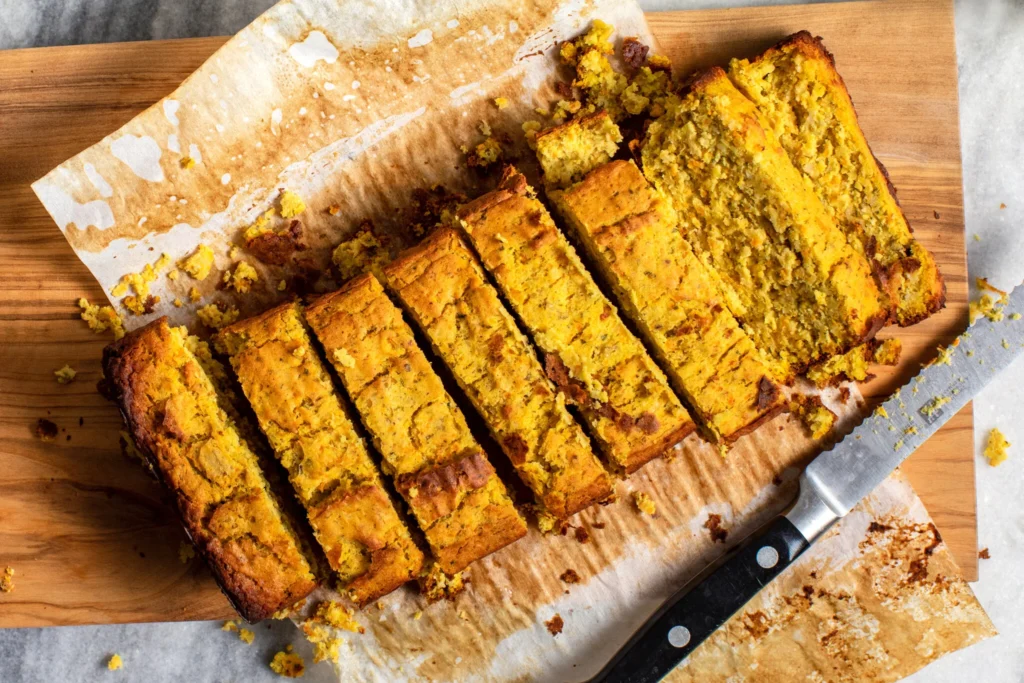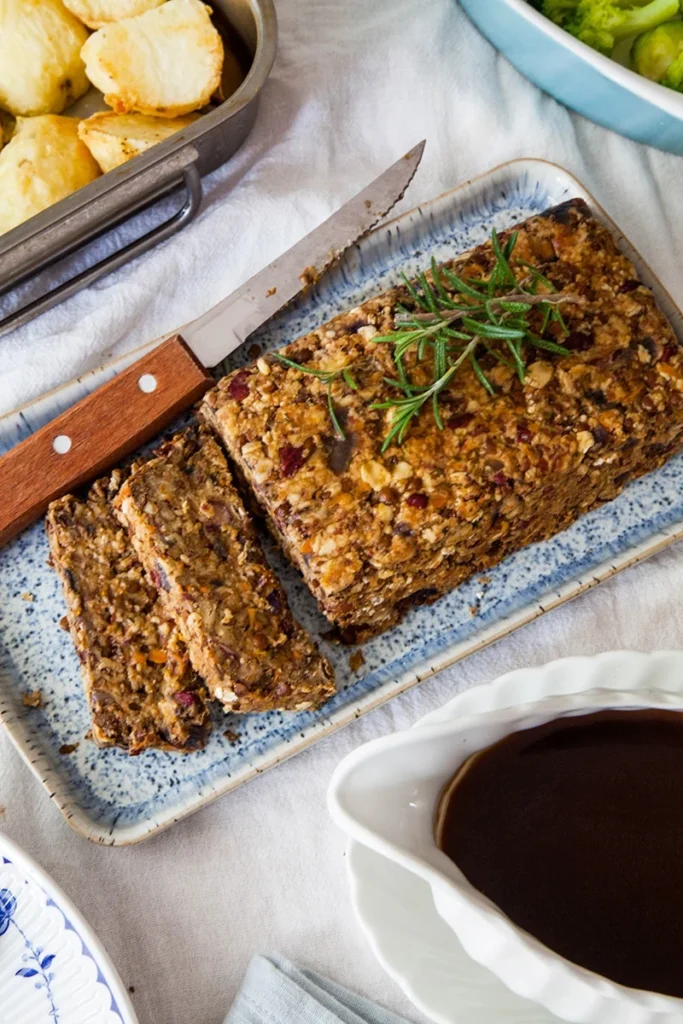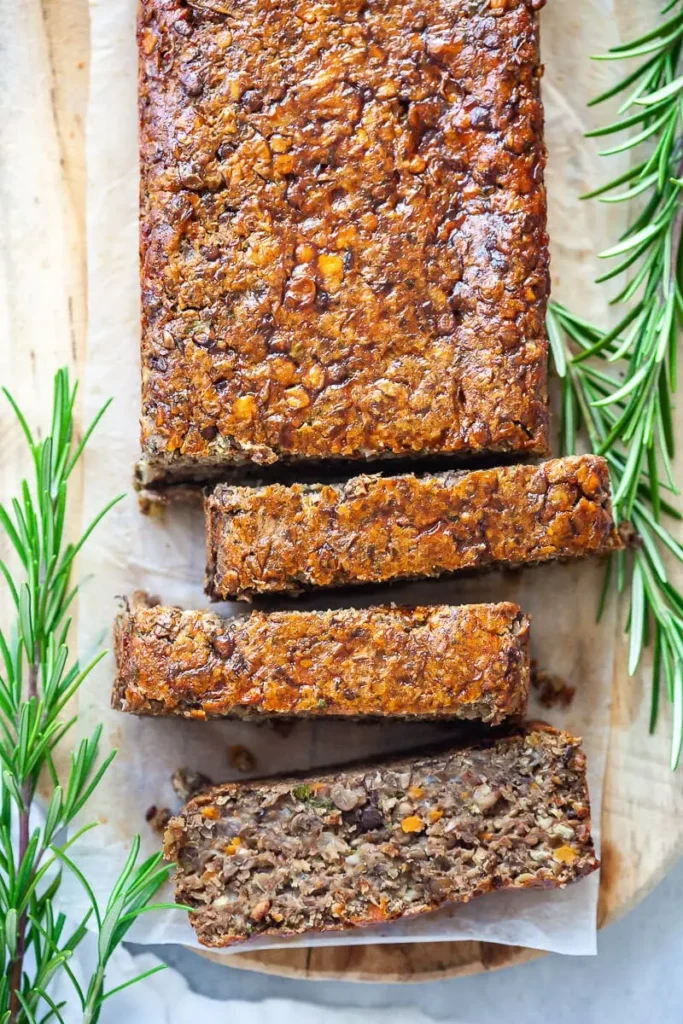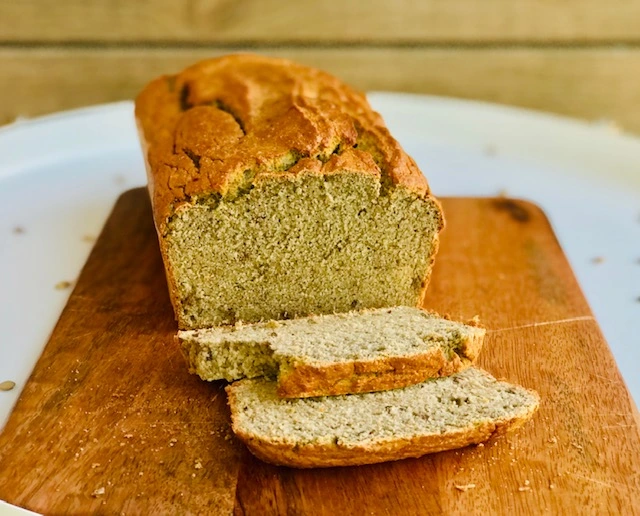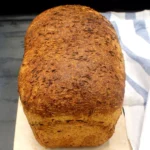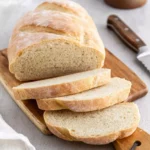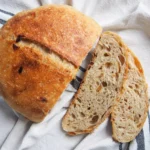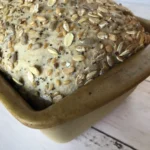Looking to add a nutritious twist to your bread-making routine?
Have you ever wondered if there’s a way to incorporate lentils into your homemade bread? Well, look no further!
This lentil bread recipe is here to fulfill your curiosity and satisfy your taste buds. With its wholesome ingredients and simple steps, you’ll soon be enjoying a loaf of bread that not only tastes great but also provides the added benefits of lentils.
So, why not give it a try and see just how delicious and nutritious lentil bread can be?
Contents
- 1 Key Takeaways
- 2 Ingredients
- 3 Mixing the Batter
- 4 Proofing the Dough
- 5 Baking the Bread
- 6 Lentil Bread Recipe
- 7 Serving and Storing Tips
- 8 Nutrition facts
- 9 Frequently Asked Questions
- 9.1 Can I Use Any Type of Lentils for This Bread Recipe?
- 9.2 How Long Does It Take for the Lentil Batter to Rise During Proofing?
- 9.3 Can I Replace the All-Purpose Flour With a Gluten-Free Alternative?
- 9.4 Can I Add Other Ingredients, Such as Herbs or Spices, to the Lentil Bread Batter?
- 9.5 How Long Can I Store the Lentil Bread Before It Goes Bad?
- 10 Conclusion
Key Takeaways
- Lentil bread is a nutritious option packed with fiber, protein, and vitamins.
- It is low in fat and cholesterol, making it a healthy choice.
- Lentil bread helps regulate blood sugar levels and promotes digestion.
- It supports heart health and can be made with various lentil flour options and alternative flours for added richness and depth of flavor.
Ingredients
To make a delicious lentil bread, gather all the necessary ingredients for this wholesome and flavorful creation. When it comes to alternative lentil flour options, you have a variety to choose from. Red lentil flour, made from ground red lentils, adds a vibrant color and a slightly nutty flavor to your bread. Green lentil flour, made from ground green lentils, has a more earthy taste and a dense texture. You can also try using a combination of lentil flours for a unique blend of flavors.
Not only is lentil bread a tasty alternative to traditional bread, but it also offers numerous health benefits. Lentils are packed with nutrients such as fiber, protein, and vitamins. They’re also low in fat and cholesterol, making them a great choice for those seeking a healthier lifestyle. Lentil bread can help regulate blood sugar levels, promote digestion, and support heart health. It’s also a great option for individuals with gluten sensitivities or allergies, as lentils are naturally gluten-free.
Mixing the Batter
As you prepare to mix the batter for your delicious lentil bread, the vibrant colors and earthy flavors of the lentil flours will come together to create a wholesome and flavorful dough. Get ready to embark on a culinary adventure as you combine the unique blend of spices and seasonings with alternative flours to elevate your bread to a whole new level. Here’s how to mix the batter for your lentil bread:
- In a large mixing bowl, combine the lentil flour with your choice of alternative flours such as almond or chickpea flour. The combination of these flours adds richness and depth to the bread.
- Add a generous amount of spices and seasonings to enhance the flavors of the lentil bread. Consider using cumin, turmeric, garlic powder, and a pinch of cayenne pepper for a hint of heat.
- Gradually pour in warm water and mix the ingredients together until a sticky dough forms. The water helps bind the flours and spices together, creating a cohesive mixture.
- Using your hands, knead the dough for a few minutes until it becomes smooth and elastic. This step helps develop the gluten in the flours, resulting in a lighter and fluffier bread.
With the batter mixed to perfection, you’re now ready to move on to the next step in your lentil bread-making journey. Embrace the freedom to experiment with flavors and enjoy the process of creating a homemade bread that’s both nutritious and delicious.
Proofing the Dough
Now that you’ve mixed the batter for your lentil bread, it’s time to move on to the next crucial step: proofing the dough. This is where the magic happens. Proofing is the fermentation process that allows the dough to rise and develop its unique flavor and texture. It’s like giving the dough time to relax and get comfortable before it goes into the oven.
There are different proofing methods you can choose from, depending on your preference and the time you have. The most common method is the traditional one, where you let the dough rise at room temperature for a specific period. This usually takes around 1-2 hours, but it can vary depending on the temperature of your kitchen.
If you’re short on time, you can use a warm proofing method. This involves placing the dough in a warm environment, such as a slightly heated oven or a proofing box. The warmth speeds up the fermentation process and helps the dough rise faster.
Another option is cold proofing, which involves letting the dough rise slowly in the refrigerator overnight or for a longer period. This method allows the flavors to develop more fully and gives the bread a slightly tangy taste.
Whichever method you choose, make sure to cover the dough with a damp cloth or plastic wrap to prevent it from drying out. This will help create a moist environment that encourages the yeast to do its job.
Proofing the dough is an essential step in bread-making that shouldn’t be rushed. Take the time to let the dough rise and develop its flavors. It’s worth the wait, and your taste buds will thank you.
Baking the Bread
Get ready to savor the mouthwatering aroma and taste of your freshly baked lentil bread. Now that your dough has proofed beautifully, it’s time to bake it to perfection. Follow these baking techniques for a perfect crust:
- Preheat your oven to 425°F (220°C) and place a baking stone or sheet pan on the middle rack.
- Before putting the bread in the oven, slash the top with a sharp knife to allow for expansion and create a rustic look.
- For a crustier bread, create steam in the oven by placing a pan of hot water on the bottom rack.
- Bake the bread for about 30-35 minutes, or until it’s golden brown and sounds hollow when tapped on the bottom.
To enhance the flavor of your lentil bread, experiment with different spices and herbs. Consider adding ingredients like rosemary, thyme, garlic powder, or cumin seeds to the dough. These aromatic additions will infuse your bread with delightful flavors and make it even more enjoyable.
As the bread bakes, your kitchen will fill with the irresistible scent of warm bread and fragrant spices. The anticipation builds as you eagerly await the moment when you can slice into your creation and taste the deliciousness that awaits.
Lentil Bread Recipe
Course: SnackCuisine: FusionDifficulty: Moderate12
servings1
1
hour500
This Lentil Bread recipe is considered moderate in terms of difficulty. While the steps are straightforward, there are a few key elements, such as working with yeast and achieving the right dough consistency, that might require a bit of practice for those new to bread making. The use of lentils also adds a unique element to the recipe, making it a slightly more involved process than a basic bread recipe. With attention to detail and following the instructions, even novice bakers should be able to successfully create this nutritious and flavorful lentil bread.
Ingredients
1 cup red lentils, rinsed and soaked overnight
1 cup water
2 cups whole wheat flour (you can also use all-purpose flour)
1 packet (about 2 1/4 teaspoons) active dry yeast
1 teaspoon sugar
1 teaspoon salt
2 tablespoons olive oil
Optional: Seeds (such as sesame seeds or flaxseeds) for topping
Directions
- Rinse and soak the red lentils in water overnight. Drain before using.
- In a small bowl, mix the active dry yeast with 1/4 cup warm water and 1 teaspoon of sugar. Allow it to sit for 5-10 minutes, or until it becomes frothy.
- In a blender or food processor, blend the soaked lentils with 1 cup of water until you get a smooth paste.
- In a large mixing bowl, combine the lentil puree, activated yeast mixture, whole wheat flour, salt, and olive oil. Mix until you have a sticky dough.
- Turn the dough out onto a floured surface and knead for about 5-7 minutes, or until the dough becomes smooth and elastic.
- Place the dough in a lightly oiled bowl, cover it with a clean kitchen towel, and let it rise in a warm place for 1-2 hours or until it doubles in size.
- Preheat your oven to 375°F (190°C). Punch down the risen dough and shape it into a loaf. Place it in a greased loaf pan, cover, and let it rise for another 30-45 minutes.
- Brush the top of the loaf with water and sprinkle seeds if desired.
- Bake in the preheated oven for 30-40 minutes or until the bread sounds hollow when tapped on the bottom.
- Allow the lentil bread to cool in the pan for 10 minutes before transferring it to a wire rack to cool completely.
- Once cooled, slice the bread and enjoy it with your favorite spreads or toppings.
Serving and Storing Tips
Indulge in the full experience of your freshly baked lentil bread by discovering the best ways to serve and store it for maximum enjoyment.
To ensure the freshness of your lentil bread, follow these tips. First, let the bread cool completely before storing it. This will prevent condensation from forming inside the storage container and making the bread soggy. Next, wrap the bread tightly in plastic wrap or place it in an airtight container to keep it moist and fresh. If you prefer a crusty texture, store the bread unwrapped or in a paper bag to allow it to breathe.
Now, let’s talk about serving this delicious loaf of lentil bread. One creative way to enjoy it is by toasting slices and spreading them with your favorite toppings. Try avocado and tomato slices, or cream cheese and smoked salmon for a delightful breakfast or brunch.
Another idea is to make lentil bread croutons for your salads or soups. Simply cube the bread, toss it with olive oil and your preferred seasonings, then bake until golden and crispy.
Nutrition facts
- Calories: Around 1270 calories
- Protein: Approximately 45-50 grams
- Fat: Approximately 20-25 grams
- Carbohydrates: Approximately 230-250 grams
- Fiber: Approximately 40-45 grams
Frequently Asked Questions
Can I Use Any Type of Lentils for This Bread Recipe?
You can use different types of lentils for this bread recipe. Lentil bread variations allow for creativity and experimentation. So go ahead and try out different lentils to add a unique twist to your bread!
How Long Does It Take for the Lentil Batter to Rise During Proofing?
To make the lentil batter rise faster during proofing, you can place it in a warm, draft-free area. Avoid common mistakes like using too much or too little yeast. The lentil bread has a unique taste compared to traditional bread, and you can enhance its flavor by adding herbs or spices. Enjoy the freedom of experimenting!
Can I Replace the All-Purpose Flour With a Gluten-Free Alternative?
Yes, you can replace the all-purpose flour with a gluten-free alternative in your lentil bread. Some of the best gluten-free flours for lentil bread are almond flour, brown rice flour, and chickpea flour.
Can I Add Other Ingredients, Such as Herbs or Spices, to the Lentil Bread Batter?
You can definitely add other ingredients to the lentil bread batter! It’s a great way to enhance the flavor and get creative with your bread. Just be mindful of the pros and cons of each addition.
How Long Can I Store the Lentil Bread Before It Goes Bad?
You can store the lentil bread for up to 5 days before it starts to go bad. To make it last longer, keep it in an airtight container in a cool, dry place. Enjoy!
Conclusion
Get ready to sink your teeth into a slice of warm, homemade lentil bread that will leave you craving for more. With its hearty texture and earthy flavor, this bread is a true delight for the senses.
The anticipation builds as you follow the simple steps of mixing, proofing, and baking the dough. Once the bread is out of the oven, your taste buds are in for a treat.
So grab a knife and get ready to indulge in this irresistible lentil bread creation.

